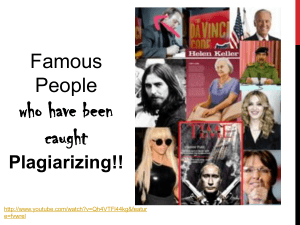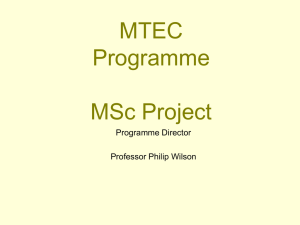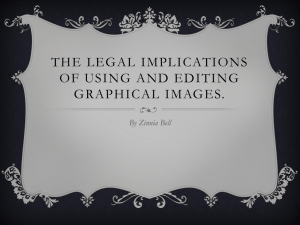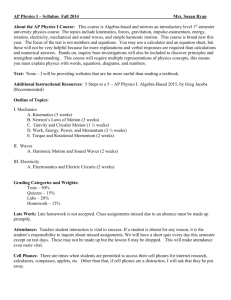the first year seminar--psych 1100 - University of Houston
advertisement
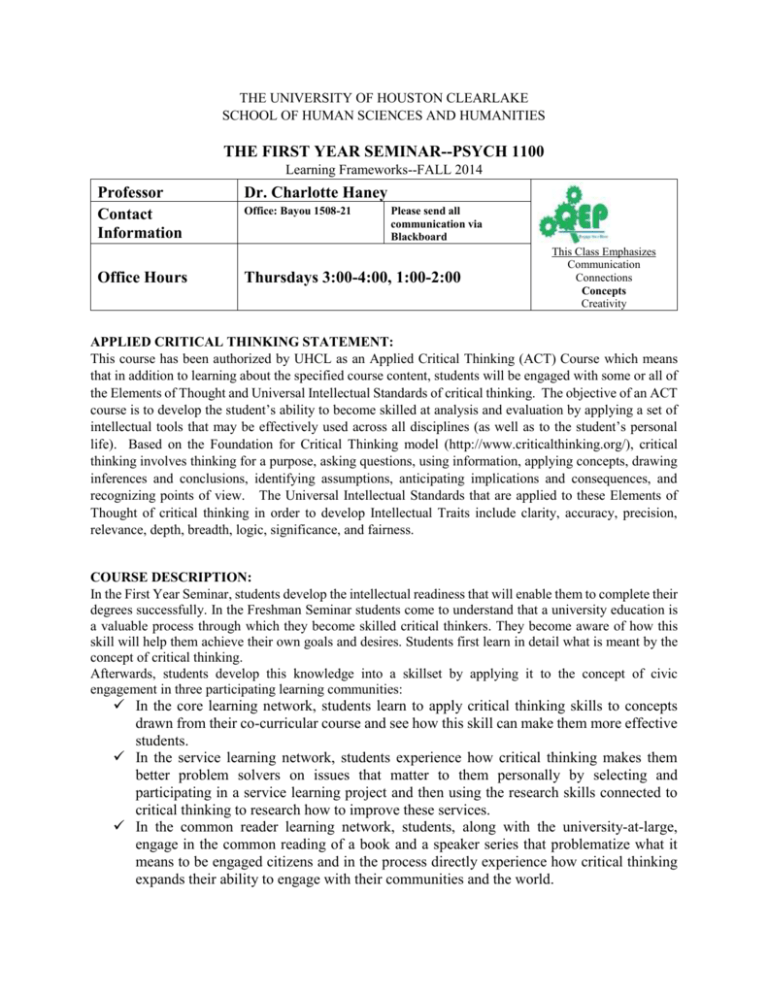
THE UNIVERSITY OF HOUSTON CLEARLAKE SCHOOL OF HUMAN SCIENCES AND HUMANITIES THE FIRST YEAR SEMINAR--PSYCH 1100 Learning Frameworks--FALL 2014 Professor Contact Information Office Hours Dr. Charlotte Haney Office: Bayou 1508-21 Please send all communication via Blackboard Thursdays 3:00-4:00, 1:00-2:00 This Class Emphasizes Communication Connections Concepts Creativity APPLIED CRITICAL THINKING STATEMENT: This course has been authorized by UHCL as an Applied Critical Thinking (ACT) Course which means that in addition to learning about the specified course content, students will be engaged with some or all of the Elements of Thought and Universal Intellectual Standards of critical thinking. The objective of an ACT course is to develop the student’s ability to become skilled at analysis and evaluation by applying a set of intellectual tools that may be effectively used across all disciplines (as well as to the student’s personal life). Based on the Foundation for Critical Thinking model (http://www.criticalthinking.org/), critical thinking involves thinking for a purpose, asking questions, using information, applying concepts, drawing inferences and conclusions, identifying assumptions, anticipating implications and consequences, and recognizing points of view. The Universal Intellectual Standards that are applied to these Elements of Thought of critical thinking in order to develop Intellectual Traits include clarity, accuracy, precision, relevance, depth, breadth, logic, significance, and fairness. COURSE DESCRIPTION: In the First Year Seminar, students develop the intellectual readiness that will enable them to complete their degrees successfully. In the Freshman Seminar students come to understand that a university education is a valuable process through which they become skilled critical thinkers. They become aware of how this skill will help them achieve their own goals and desires. Students first learn in detail what is meant by the concept of critical thinking. Afterwards, students develop this knowledge into a skillset by applying it to the concept of civic engagement in three participating learning communities: In the core learning network, students learn to apply critical thinking skills to concepts drawn from their co-curricular course and see how this skill can make them more effective students. In the service learning network, students experience how critical thinking makes them better problem solvers on issues that matter to them personally by selecting and participating in a service learning project and then using the research skills connected to critical thinking to research how to improve these services. In the common reader learning network, students, along with the university-at-large, engage in the common reading of a book and a speaker series that problematize what it means to be engaged citizens and in the process directly experience how critical thinking expands their ability to engage with their communities and the world. In these three learning networks, students actively engage the central question: “How does critical thinking help us become engaged, purposeful global citizens?” Through this active engagement students become productive users of critical thinking skills who know the value of critical thinking in real world settings. STUDENT LEARNING OBJECTIVES: 1. Develop a clear understanding the fundamental and powerful concepts in this course and their co-requisite course. 2. Learn how to identify relevant information in the peer-reviewed literature. 3. Use that information to logically develop a research question (question at issue) connected to their service learning project. 4. Logically communicate their point of view regarding the examples of civic engagement present in the learning networks and fairly examine points of view that differ from their own. . FUNDAMENTAL AND POWERFUL CONCEPTS: Think of these as the twenty-years-from-now ideas. In twenty years long after you have forgotten my name, these fundamental concepts, if mastered in a deep and personal way, will be tools that you can use to understand the world. During this semester, you can use these concepts to think critically about any of the new ideas or information present in your learning networks. The Fundamental and Powerful Concepts in this course are: Critical Thinking, Information, Clarity, Relevance, Logic, Fairness, Civic Engagement, Citizenship, Voice, and Marginality. The Fundamental and Powerful Concepts in your co-requisite course are: Government, Politics, Power, Function, and Structure TEXTS & REQUIRED MATERIALS Giridharadas, Anand (2014) The True American. W.W. Norton & Company: New York. Elder, Linda and Richard Paul (2009) Critical Thinking: Concepts & Tools. The Foundation for Critical Thinking: Tomales, CA. Paul, Richard and Linda Elder (2009) How to Study and Learn. The Foundation for Critical Thinking: Tomales, CA. Additional readings are available on Blackboard and due the day marked on the syllabus. Please bring a composition notebook (which you will use as your intellectual journal) with you to class everyday. COURSE REQUIREMENTS: Active Learner Class Participation Critical Thinking through Concepts Project Service Learning Joining a Scholarly Conversation Project 25% 25% 25% 25% 100% In addition, all new students are required to complete the ETS Proficiency Profile. This is a pass/fail requirement of the course. Active Learner Class Participation 25% Logically communicate their point of view regarding the examples of civic engagement present in the learning networks and fairly examine points of view that differ from their own This is a highly transferable skill, but one that requires practice. Therefore, your active participation in the course is required. You are allowed two absences for any reason after that a full letter grade will be deducted from your semester grade for each absence regardless of the cause. In addition, you are expected to attend at least two of the Common Reader Speaker Series events this fall (Wednesday section will need alternative events). 1. ACT ACTIVITY (Student Learning Outcome #4) The first portion of each class will be engaged in an in-depth discussion of the assigned reading. You will be placed in a reading team and will prepare written materials each week to facilitate your discussion according to your assigned reading team role. Roles will include: Discussion Leader, Passage Master, Creative Connector, Devil’s Advocate, Global Citizen and Reporter. Roles will rotate each week and will be assigned for the entire semester during the first three weeks of the semester. You will receive weekly grades on your written materials. You will receive feedback on how well you applied the UNIVERSAL INTELLECTUAL STANDARDS in your written preparation materials and your work will be assessed as Excellent, Adequate, or Fails to meet expectations. At the end of most class periods, you will write in your intellectual journal. In this journal you will link critical thinking to everyday life by reflecting critically on situation that occurred in the previous week. At the end of the semester you will turn in a portfolio containing each graded assignment, your intellectual journal and a peer evaluation of yourself and each member of your reading group. These portfolios should demonstrate your intellectual growth in terms of your confidence in your ability to reason, your fair-mindedness and your intellectual empathy. At this point, this portfolio will be evaluated to determine that you have meet the expectations of this assignment and that these artifacts demonstrate your increased ability to use logic to communicate a point of view and fairness to analyze divergent points of view. Sample Rubric for Active Learner Portfolios Student Learning Outcome SLO #4: Logically communicating point of view and fairly examining points of view that differ from their own Fails to meet Expectations Incomplete portfolio. Preparation materials that do not bring together ideas and examples together in an orderly fashion. Consensus of peer evaluations that student did not communicate in a fair or logical manner. No evidence of increased ability to communicate P.O.V. in writing or dialogue or use divergent P.O.V.’s to analyze real world situations. Adequate Portfolio is complete. Student demonstrates an increasing ability to communicate their P.O.V. in an ordered manner-using examples and evidence in a meaningful way more often than not. Consensus of peer evaluations is that student has become more proficient at communicating logically and fairly. Student regularly demonstrates the ability to logically and fairly examine the P.O.V.’s present in real world situations. Excellent In addition, the excellent portfolio demonstrates an increasingly consistent ability to communicate their own P.O.V. logically and a willingness to use a fair depiction of the logic of divergent P.O. V.’s to question their own perspective. 2. From time to time, you will be asked to complete short homework assignments. These are due at the beginning of class and should be turned in with your typed preparation materials so that you are not marked absent for the day. If you miss a class make sure to contact a classmate or your peer mentor to make sure that you do not miss an assignment given in class. 3. In keeping with our theme of civic engagement, it is important that we express our ideas in a respectful manner that advances our conversation. We should all consider not only the comments that we want to make, but the overall classroom dynamic: who is speaking more, who less? How might we best contribute to an atmosphere that enables everyone to participate meaningfully? How do we acknowledge and negotiate disagreements? Most importantly, consider what a classroom of engaged citizens scholars would look like? How might we collectively create such a space? On a practical note, checking email, texting, and surfing are behaviors which do not encourage our conversation and are not permitted during class time. Laptops and phones should be off and stored out of sight at all times unless their use is specifically requested by the instructor. Service Learning 25% You and your reading group will jointly select an organization at UHCL’s Community Service Fair on September 10th. You will need to complete any training required by that organization and five additional volunteer hours. If at all possible, you should complete these hours with members from your reading group. Proof of completion of these service hours must be submitted by October 20th. Conceptual Toolkit ACT ACTIVITY (Student Learning Outcome #1) 25% Develop a clear understanding the fundamental and powerful concepts in this course and their corequisite course. STEP 1 Using the key concepts from this course and your co-curricular course, you will create your own personalized toolkit. Think of it as your own ‘personalized’ textbook. Use it throughout the semester as a reference in this course and your co-requisite course. You should use a format, examples and wording that make sense to you, and in the process you should: State the definition of each concept in your own words Elaborate on that definition Exemplify the concept Illustrate the concept It will then become your map for analyzing the public policies and issues presented in this course and should provide you with an organizing framework as you study for your co-requisite course. STEP 2 Beginning the 9-30, students will select and sign up for three collaborative lectures during the remainder of the semester to which to contribute. The instructor will post a four slide policy topic to http://prezi.com/ one week prior to the lecture date. This prezi slide show will introduce a university, municipal, state, federal or international policy. It will then prompt you to examine this policy using your conceptual toolkit. You will then add a slide to the prezi that addresses some aspect of this policy using two concepts from your conceptual toolkit by the day prior to the lecture. During class, the instructor will introduce the topic and the students collaborating on the day’s lecture will each have five minutes to logically explain the relevance of their slide. Your toolkit will be evaluated on the clarity with which you are able to use the fundamental and powerful concepts to analyze the new information presented in these collaborative lectures. Student Learning Outcome SLO # 1. Develop a clear understanding of the Sample Rubric for Conceptual Toolkit Fails to meet Expectations Adequate Incomplete toolkit. Toolkit is complete. Student does not Students participates in all participate in all three three collaborative Excellent In addition, the excellent conceptual toolkit project demonstrates the student’s fundamental and powerful concepts. collaborative lectures. Student is unable to accurately express the relevance of two fundamental and powerful concepts to the question at issue in the collaborative lecture. lectures. Student is able to accurately express the relevance of fundamental and powerful concepts to the question at issue in the majority of their comments during the collaborative lectures. Joining a Scholarly Conversation Project ability to use fundamental and powerful comments to make clear and relevant comments on any of the collaborative lectures— even those in which the student is not a named collaborator. 25% ACT ACTIVITY (Student Learning Outcome #2) Learn how to identify relevant information in the peer-reviewed literature. As members of our university, you are joining an academic community. Universities are not ivory towers where smart people do research just for the sake of curiosity. Universities are part of a web of interconnected communities through which we share our research and ideas so that together we can build knowledge-knowledge which can be used to resolve problems and improve our lives. New students at the university are often unaware that they are now participating in these scholarly conversations through their coursework. In this project students will be introduced to existence of these scholarly conversations in a very concrete manner. Students will produce an annotated bibliography in EndNote for all of the readings that they are required to read in ALL of their semester courses. They will then add to this annotated bibliography by researching five peer reviewed articles on the open-ended topic of civic engagement around the social need encountered in the student’s service learning. After examining all of this information for relevancy, students should clearly articulate a narrow question related to this topic that could be pursued in further research. Student will then write a one-page summary that communicates the relevance or irrelevance of the information in the bibliography and why the question they have identified for further research is the question-at-issue, a question which in answering will lead to better information or better services. Sample Rubric for The Scholarly Conversation Student Learning Outcome SLO #2 Learn how to identify relevant information in the peer-reviewed literature. Fails to meet Expectations Incomplete annotated bibliography. Missing citations. Annotations are too brief to be meaningful or more or less repeat language from the article or book. Summary does not explain how the information in the bibliography is or is not relevant to the question at issue. Adequate Annotated bibliography is complete. Annotations attempt to apply the students own evaluation to the reading content. Summary generally demonstrates how the readings in the bibliography are or are not relevant to the question at issue, with some minor deviations. Excellent In addition, the excellent project focuses on the most relevant information associated with the question at issue and is able to precisely articulate the relevance of this information. COURSE BUSINESS Late Assignments: All assignments should be turned in on time unless arrangements are made with the instructor prior to the class meeting when an assignment is due. Reading Group Preparation materials and homework are only accepted at the beginning of class on the due date. Late assignments will be penalized 10% off of the total grade for each day they are late. Blackboard: Please use BB for all course communication. I will check email Mondays, Wednesdays and Thursdays. If you have a personal question please email me, the peer mentor or the embedded librarian but if you have a question that is general interest, please post it in the Questions tab. I encourage you to blog or post links in the stuff to share tab. It is your responsibility to familiarize yourself with Blackboard, especially the tools utilized in this course. Should you run into technical difficulties please contact Technical support (support information is on log on screen or call 281-283-2828). Disabilities: The University of Houston System complies with Section 504 of the Rehabilitation Act of 1973 and the Americans with Disabilities Act of 1990, pertaining to the provision of reasonable academic adjustments/auxiliary aids for students with a disability. In accordance with Section 504 and ADA guidelines, each University within the System strives to provide reasonable academic adjustments/auxiliary Aids to students who request and require them. If you believe that you have a disability requiring an academic adjustments/auxiliary aid, please contact your University’s student disability services center (281) 283-2627. Incompletes: A grade of “I” is only given in cases of documented emergency or special circumstances late in the semester, providing that you have been making satisfactory progress. A grade contract must be completed and the criteria adhered to. Withdrawals: November 10th is the drop date which is the last day to withdraw or drop without a grade penalty. At UHCL, students are not automatically dropped from classes for absences. If you need to drop the class, make sure that you take action so that your overall G.P.A. is not compromised. Career and Counseling Services: Need help creating a resume or job interview tips? Need to talk to someone about life or other issues? Visit Career and Counseling Services. Short-term individual counseling sessions, seminars, workshops and small group experiences are available to help students grow toward academic and personal goals. SSB 3103; 281-283-2580 The Writing Center: This is an instructional facility designed to provide all university students with peer tutors to help with their writing projects. Their primary function is to teach writing. They will work with students on any type of writing task; however, they do not provide editing service. Students must bring their own papers to their meetings and are responsible for the quality of their final products. Peer tutors will work with students at any stage of the writing process: from idea generation to style, grammar, and editing strategies. SSB 2105; 281-283-2910 Six Drop Rule Limitation: Students who entered college for the first time in Fall 2007 or later should be aware of the course drop limitation imposed by the Texas Legislature. Dropping this or any other course between the first day of class and the census date for the semester/session does NOT affect your 6 drop rule count. Dropping a course between the census date and the last day to drop a class for the semester/session will count as one of your 6 permitted drops. You should take this into consideration before dropping this or any other course. Visit www.uhcl.edu/records for more information on the 6 drop rule and the census date information for the semester/session. Academic Honesty: Academic dishonesty in any form will not be tolerated in this class. Specific policies are clearly outlined in your student catalog, and will not be reproduced here. Please note that I consider any type of academic dishonesty a very serious offense, and will follow the university disciplinary procedures for any violation encountered. Plagiarism of any type may result in an F in the course, or a zero for a paper, regardless of how much coursework has been completed up to that point. Copying the work of another or paraphrasing another person without proper citation is plagiarism. All UHCL students are responsible for knowing the standards of academic honesty. Please refer to the UHCL catalog and the Student Life Handbook for the University Academic Honesty Policy. The UHCL Library also has helping information on avoiding plagiarism. The UHCL Writing Center also has a statement on plagiarism. Another wonderful source is www.plagiarism.org. Did you know you can be guilty of plagiarism without knowing it? Improper citation of sources or too much paraphrasing is plagiarism, even if you do not intend to plagiarize. Unintentional plagiarism is still plagiarism. So the "I didn't know" defense will not work. In addition, plagiarism can occur in the draft form of a paper as well. Plagiarism is the use of the work of others without giving credit. For the purpose of this class, direct plagiarism will be defined as four or more consecutive words taken directly from a source without being placed in quotation marks or without citing the source. In addition, taking a sentence from another source and changing a few words is still plagiarism. This is not equivalent to putting ideas into your own words. It only shows a student can use a thesaurus to alter a few words. This is stated more generally in the University Catalog under the Academic Honesty Policy. It would be very appropriate for you to read this entire policy for your information and for your understanding of the rights of both instructors and students. Plagiarism is a serious offense. It is literally stealing someone else's words. This is not merely against class or University policy, it is against the law and is considered an affront to academic and moral integrity. "Cheating" or copying from another student or out of the book is a form of plagiarism and will be treated as such. The two most significant reasons academic dishonesty is dealt with strongly are as follows: The original intent of educational institutions is to provide a learning environment. You do not learn by copying others. If you cannot discuss or write something in your own words (with the exception of technical phrases, definitions, conceptual labels, etc.), you do not understand it. You are not only unfair to yourself, but to others. You are using their hard work, their efforts, as your own. If plagiarism or cheating is found in your work, you may earn a zero for that assignment. Further punishment will be relative to the amount of plagiarism and whether or not it is found in your other assignments. You may also receive a zero for the course, depending on the violation. Please note that changes to the syllabus may occur at the instructor’s discretion and will be announced in class or on Blackboard. You are be responsible for any changes. Week Week #1 Topic/Weekly Objective Navigating a syllabus Readings/Assignments Due Ask a professor to clarify some aspect of their syllabus or ask them to explain 8-26 Objective: Students will understand why university courses use a syllabus and master the skills for clarifying these important documents. what the most important questions the course will address are. Report back next week. Week #2 Why critical thinking?/ What are the beautiful questions of your courses? HTS&L: 4-9 9-2 Giridharadas: Leavings Objective: Students will be able to clearly articulate a definition of critical thinking. Week #3 9-9 How do we ensure that we are engaged in quality thinking? Objective: Students will know the intellectual standards and have practice in the questions that can be used to apply them. Week #4 9-16 Going Beyond Google and Thinking About Information Sept 10, 11, 12, 15 Objective: Students will understand that information varies in quality and how the library can be used as a place to find quality information. Students will become familiar with EndNote. CTC&T: 2-7 HTS&L: 10-15 Giridharadas: The Chore Bring in syllabi from all courses CTC&T: 8-10 Giridharadas: Outpatient Week #5 Evaluating our reasoning CTC&T: 11-17 9-23 Objective: Students will learn how to evaluate reasoning and use this information to perform a selfevaluation of themselves as students. HTS&L: 16-24 Giridharadas: 187 Ask your instructor in your co-requisite course one of the questions from HTS&L 37. Report Back. Week #6 Envisioning Critical Societies CTC&T: 19-23 9-30 Objective: Students will understand the principle of fairness in critical thinking and use this standard to consider how cultivating the Intellectual Traits of Humility, Autonomy, Integrity, Courage can help overcome the egocentric and sociocentric thinking that is detrimental to creative problem solving. Giridharadas: Hospitaliano! Week #7 Introduction to Library Research Databases CTC&T: 18 10-7 Oct. 8,9,10,13 HTS&L: 32, 45 Giridharadas: [Please Write Back] Week #8 10-14 Collaborative Lecture #1: Universal Human Rights Act Objective: Students will become more proficient in clearly articulating their own critical analysis of public policy utilizing their conceptual toolkit. Ask your instructor in your co-requisite course one of the questions from HTS&L 36. Report back. Giridharadas: Frequent-Flyer Miles Week #9 Collaborative Lecture #2: Civil Rights Act of 1964 Giridharadas: Gadfly 10-21 Objective: Students will become more proficient in clearly articulating their own critical analysis of public policy utilizing their conceptual toolkit. Read and annotate one article Week #10 Where do I fit in the university? Belongingness Panel Giridharadas: The New American 10-28 Objective: Students will identify their place in the university and understand the importance of finding support Read and annotate one article Week #11 Collaborative Lecture #3: Equal Rights Ordinance Giridharadas: Bro 11-4 Objective: Students will become more proficient in clearly articulating their own critical analysis of public policy utilizing their conceptual toolkit. Read and annotate one article Week #12 Collaborative Lecture #4: Title IX Giridharadas: Uncle 11-11 Objective: Students will become more proficient in clearly articulating their own critical analysis of public policy utilizing their conceptual toolkit. Read and annotate one article Week #13 Collaborative Lecture #5: DACA Giridharadas: PowerPoint 11-18 Objective: Students will become more proficient in clearly articulating their own critical analysis of public policy utilizing their conceptual toolkit. Read and annotate one article Week #14 Collaborative Lecture # 6: Americans with Disabilities Act Giridharadas: Hula Hoop 11-25 Objective: Students will become more proficient in clearly articulating their own critical analysis of public policy utilizing their conceptual toolkit. Week #15 12-2 Week #16 12-9 Potluck: Envisioning our role in building engaged, thinking communities. No final Giridharadas: Arrivals



